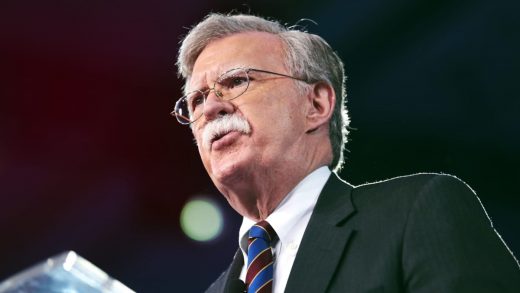Will The Indictment Of Iranian Hackers Prove The Pretext For John Bolton’s War?
By Sarah Kendzior
On Friday, Deputy Attorney General Rod Rosenstein announced the indictment of nine Iranians for conspiring to hack and defraud American universities and businesses on behalf of the Iranian government. Rosenstein vowed harsh repercussions for the Iranian hackers, including their extradition to the United States and imprisonment if convicted.
The strongly worded presser stood in stark contrast to the Trump administration’s approach to hacks by Russia, a far more pervasive threat to the United States. Since 2014, Russia has hacked the State Department, the Department of Defense, the Democratic National Committee, the Republican National Committee, the personal emails of millions of Americans, and most notably, critical infrastructure including the power grid. Despite a Senate ruling of 98-2 to impose sanctions on Russia for their aggressive actions, President Trump has instead mollified the Kremlin, refusing to meaningfully target Russia’s oligarchs and not even discussing the cyberattacks (or, for that matter, Russia’s recent chemical attack on U.S. ally U.K.) in his call this week with President Putin.
While the contrast between the Trump administration’s treatment of Iranian and Russian hackers is alarming in its own right, the most troubling aspect of the announcement may be the timing. Less than 24 hours before the indictments were revealed, Trump appointed notorious warmonger John Bolton as his new national security advisor, effective April 9. Bolton has been seeking to invade Iran for at least 15 years.
Much as he backed the Iraq War long after its premise was proven to be fraudulent, Bolton has insisted, without evidence and in defiance of the International Atomic Energy Agency’s assessment, that Iran is not honoring its commitment to constrain its nuclear program, and that military invasion is necessary. He has repeatedly insisted that the U.S. should abandon the Iran deal completely, appearing on FOX News–Trump’s main repository of policy advice–to argue that Trump should “just get out of it.”
But while Bolton decries the idea of Iran bearing nuclear weapons, he has no such aversion when it comes to the U.S. using theirs. In the fall of 2017, as tensions between the U.S. and North Korea ran sky-high, Bolton repeatedly called for a pre-emptive strike, one that would likely lead to nuclear war. Bolton differs here from Trump only in his experience and bureaucratic prowess: Trump has fantasized about using nuclear weapons for over 30 years – “If we have them, why not use them?” he famously said–and has proposed massive spending on a new nuclear arsenal. Trump is the only person in the White House authorized to order the use of nuclear weapons, but his hawkish cabinet has abetted his desire. In January, the Pentagon announced in its updated nuclear posture review that nuclear strikes were a legitimate response to nonmilitary attacks if they involved “extreme circumstances”, citing a major cyberattack as an example.
Nuclear weapons experts denounced the plan as reckless, but until Friday it seemed unlikely to be put into action: after all, Russia has been aggressively hacking us for all of Trump’s tenure and received sycophancy instead of strikes in response. But the Iranian indictments, combined with the implementation of Bolton, may change that. If the Iranian hacks–which, according to Rosenstein, caused $3.4 billion in damage–are considered “extreme circumstances” by the White House, nuclear strikes may be on the table.
So far, there has been little logic to Trump’s self-guided military incursions: he allegedly bombed Syria on Ivanka’s whim, dropped an unprecedented MOAB on Afghanistan after lapping up media praise for the Syria bombing, and spent the last 16 months antagonizing North Korea on Twitter while having various emotional meltdowns. His only steady foreign policy stance has been deference to Russia, and while both Bolton’s predecessor H.R. McMaster and Secretary of Defense James Mattis are also hawkish on Iran, they have not proposed invading the country to enact “regime change”.
Bolton, who has vowed that the U.S. oust the current Iranian government by 2019, has no such hesitations. For Bolton, the answer to any international crisis is always war, and the indicted Iranian hackers, presented with much fanfare by Rosenstein, give the administration an ostensible pretext. Needless to say, an administration that runs on “alternative facts” will simply invent an excuse where none exists, but the timing of the announcement seems geared to direct the nation’s attention to Iran as a major threat, laying the groundwork for Bolton to pursue military and even nuclear strikes–now justified in official documents by the changes in the Pentagon’s nuclear posture review–when he begins his tenure in April.
Bolton is an apocalyptic appointment, one who endangers not only Iran but the entire world. Bolton’s bloodlust, bad temper, and blind faith in military solutions previously rendered him unhireable, but for Trump, whose most maniacal instincts will be validated, he is a gift—a like-minded sadist who, unlike Trump, knows how to effectively navigate bureaucracy.
There is almost nothing to keep the two of them in check. Bolton will enter a White House with a gutted State Department, multiple officials under investigation for illicit Kremlin ties (which Bolton also shares) and illicit work with Cambridge Analytica (with whom Bolton also worked), and a support team of religious zealots, Islamophobes, kleptocrats, and mercenaries, all of whom would likely find a rearrangement of the Middle East power structure advantageous. It is an administration that has long abandoned accountability, violating both White House protocol and the constitution with impunity, and firing officials—like James Comey and Andrew McCabe—who attempt to investigate the corruption.
Rosenstein presented the arrest of the Iranian hackers as a triumph for the rule of law, and in its own right, any clampdown on harmful hackers is a positive development. But no development exists in isolation, and no opportunity for exploiting the system for nefarious ends goes unused by the Trump team. Under Bolton, expect the worst.
(42)














